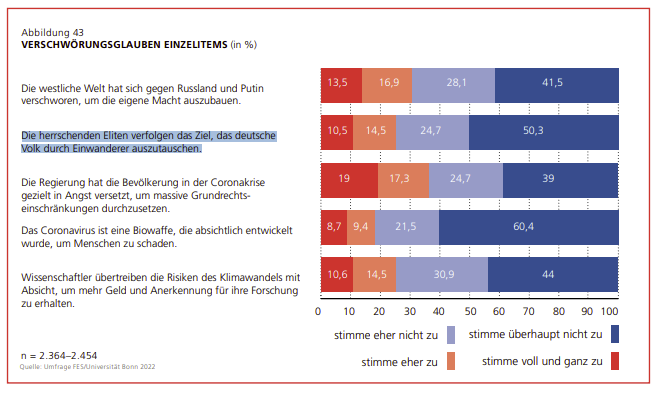The German political and media class continues to exist in order to assist everyone at every corner of the planet, except of course for the German people who constitute the nation over which they rule.
This lack of care for the German people is best demonstrated by the staggering numbers of immigrants, both legal and illegal, who continue to arrive in Germany despite a massive strain on the country’s resources and widespread public opposition. 78% of Germans feel that the integration of recent arrivals into the labor market and broader society is not going well, while 80% of Germans are concerned that deportations are not taking place in a timely manner. A further 59% of Germans are concerned about the negative consequences of immigration and the most staunchly pro-German party, the AfD, saw record highs in national opinion polling as recently as January.
A further quarter of Germans are aware of the Great Replacement and the realities associated with demographic change, with the German working class and German women polling among the most aware of the realities of demographic change.

The Current Situation:
Despite this widespread public opposition to continued mass immigration and growing awareness of the realities of the Great Replacement the German ruling class continues to enable nation-altering levels of immigration. In 2023 some 722,370 migrants applied for asylum in Germany, not including Ukrainians fleeing the war in their homeland. The countries with the most applicants were Turkey, Syria, Afghanistan, and other Middle Eastern states, while large numbers also came from Asia and South America.
While many of these individuals will have their applications for asylum denied, few will be deported and they will remain in the country for the foreseeable future.
Including labor migrations and removing failed applicants still puts the net immigration total for Germany somewhere around 710,000 for 2023, and even higher when including the failed non-deported asylum seekers.
These numbers serve to compound the massive demographic change that Germany has experienced since the 1980s, and which has only accelerated since 2015. Recent figures from the German Federal Statistical Office (Destatis) show that the total number of foreign-born persons in the country has exceeded 15.2 million people, and now constitute 18.4% of the overall population. A further 5 million people were born to two parents who were themselves born outside of the country.
A full 24% of the German population was either born outside of the country or born in Germany to two foreign parents. This represents roughly 20.2 million people in a country of 84.6 million people whose native population has been experiencing fertility decline since 1969.
The most recent ‘ethnic’ statistics, again from the Federal Statistical Office, show the background of the German population by country of origin and second-generation immigrant status. This data shows that 85.1% of the German population is of ‘European’ extraction. A further 70.3% of the population is of non-foreign origin, the closest category to being truly German.
It is here we should mention that these numbers are most certainly inaccurate for an ethnic understanding of the country. Some five million Turks of a third generation or greater status are classified as German under current statistical arrangements, while nearly 3 million Germans from Russia and Kazakhstan are classified as having a foreign background.
Adjusting for these figures places the ethnic German population somewhere in the range of 66-68% of the country’s population.
In total, some 14 million people or more in Germany have a non-European background. Many of these non-Europeans do not yet possess German citizenship and those that do are often loosely connected to Germany.
Solutions:
The simplest and most efficient method of reducing the non-German population of Germany would be to enact widespread cancellation and non-renewal of visas. Germany has suspended all immigration in recent times, in fact. During the COVID-19 pandemic, the German visa system was largely stopped and inflow into the country dropped dramatically.
This same process could be used again, under another guise, in order to suspend the issuance of new visas and or renewal applications. This process would see the visas of 43% of the non-European population of Germany canceled and with modest levels of immigration enforcement, this step would dramatically lower Germany’s non-European population.
The next step is to deal with immigrants who have falsely acquired German citizenship and can be denaturalized according to current German law. Germany has seen notable rises in the number of fake paternity claims which has enabled thousands of immigrant women to be naturalized in Germany. Similarly, marriage scams operating across European borders in Germany and Denmark (as simply one example) bring thousands of people into the country a year under false pretenses, many of whom are later naturalized.
Based on reports from the German government itself it is likely that hundreds of thousands of foreigners have entered Germany through the family reunification system and falsely been granted citizenship which was then extended to their decidedly non-German children as well.
Conclusion:
While the Germans may not be able to deport every non-European in their country, a comprehensive policy of visa cancellation, visa non-renewal, and investigation into widespread citizenship fraud could bring about the repatriation of well over half of the non-Western populace.
Ethnic Germans would rise to a proportion of the population much closer to 75-80%.
It is from this initial wave of policy action that the German nation could then assess the integration status of the non-European citizens who remain in Germany and decide whether laws should be further changed in order to facilitate voluntary repatriation of this population.
White Papers is attempting to double our donor base this summer! Please Support our mission to take on more writers and policy experts:
Zelle: whitepapersinstitute@protonmail.com
Buy us a coffee: https://www.buymeacoffee.com/wppi
Linktree: https://linktr.ee/wppi
Snail Mail: White Papers Policy, PO Box 192, Hancock, MD 21750






